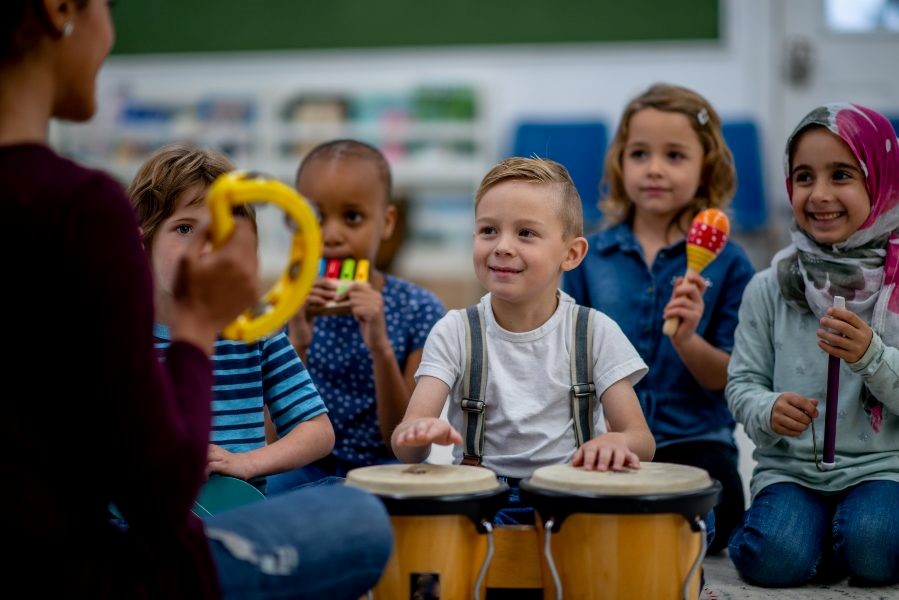The Role of Music and Movement in Early Childhood Education

At Just Children Child Care Centers, we believe in the profound impact of music and movement in early childhood education. With locations in Feasterville-Trevose, PA, Bensalem, PA, Philadelphia, PA, Medford, NJ, and Mount Laurel Township, NJ, we are dedicated to fostering environments where children can thrive through the power of rhythm, melody, and motion. Music and movement activities are not just fun; they are essential components of child development, contributing to cognitive, physical, emotional, and social growth.
The Benefits of Music in Education
The benefits of music in education are vast and well-documented. Music stimulates various areas of the brain, aiding in the development of language, motor skills, and emotional regulation. Incorporating music in the classroom can enhance memory and learning capabilities. For example, songs with repetitive phrases and melodies can help toddlers and preschoolers remember new words and concepts. Music activities for toddlers, such as singing nursery rhymes or playing simple instruments, lay the groundwork for future academic success by improving listening skills and attention spans.
The Role of Music in Child Development
Music and brain development are intricately linked. Studies have shown that children who engage in musical activities exhibit enhanced brain function and structure. Music encourages neural connections, particularly in areas responsible for language and spatial reasoning. The role of music in child development is crucial, as it not only boosts intellectual growth but also nurtures emotional intelligence. Children learn to express themselves and understand their emotions through music, making it a vital tool for holistic development.
Importance of Rhythm in Early Childhood
Rhythm is a fundamental element of music that plays a significant role in early childhood development. The importance of rhythm in early childhood cannot be overstated. Rhythmic activities, such as clapping hands, tapping feet, or drumming, help children develop a sense of timing and coordination. These activities also support language development by enhancing the ability to recognize patterns and sequences, which are essential for understanding the structure of language.
Movement Activities for Preschoolers
Movement activities for preschoolers are equally important as musical activities. Creative movement for kids, such as dancing, jumping, or mimicking animal movements, promotes physical health and gross motor skill development. These activities also encourage creativity and imagination. At our centers in Philadelphia, PA, and Medford, NJ, we incorporate movement activities that help children develop balance, coordination, and spatial awareness. Movement activities also provide opportunities for children to learn about their bodies and the space around them.
Music Therapy for Children
Music therapy for children is an effective way to address various developmental challenges. Music therapy can help children with emotional, behavioral, or cognitive difficulties by providing a non-verbal outlet for expression and communication. Through structured musical activities, children can improve their social skills, reduce anxiety, and enhance their overall well-being. Our centers in Feasterville-Trevose, PA, and Bensalem, PA, recognize the therapeutic benefits of music and incorporate music therapy techniques into our programs to support all aspects of child development.
Incorporating Music in the Classroom
Incorporating music in the classroom is a core practice at Just Children Child Care Centers. Our educators use music as a tool to create a dynamic and engaging learning environment. Music is integrated into daily routines, transitions, and instructional activities to make learning more enjoyable and effective. For example, we use songs to signal the start and end of activities, making transitions smoother and helping children understand the flow of the day. Music is also used to reinforce academic concepts, such as using counting songs to teach numbers or alphabet songs to support literacy skills.
Creating a Holistic Learning Experience
At Just Children Child Care Centers, we understand that a holistic approach to education involves nurturing all aspects of a child’s development. Music and movement in early childhood play a pivotal role in achieving this goal. By providing a rich array of music activities for toddlers and movement activities for preschoolers, we ensure that children receive a balanced and comprehensive education. Our programs are designed to foster cognitive, physical, emotional, and social growth, preparing children for future success. Contact us today to find out more.
Music & Movement at Just Children
The role of music and movement in early childhood education is indispensable. At Just Children Child Care Centers, with our locations in Feasterville-Trevose, PA, Bensalem, PA, Philadelphia, PA, Medford, NJ, and Mount Laurel Township, NJ, we are committed to integrating these vital elements into our educational framework. By recognizing the benefits of music in education and the importance of rhythm and movement, we create enriching environments where children can develop their full potential. Encourage your child to engage in musical and movement activities today – the benefits are endless, and the joy is immeasurable.
